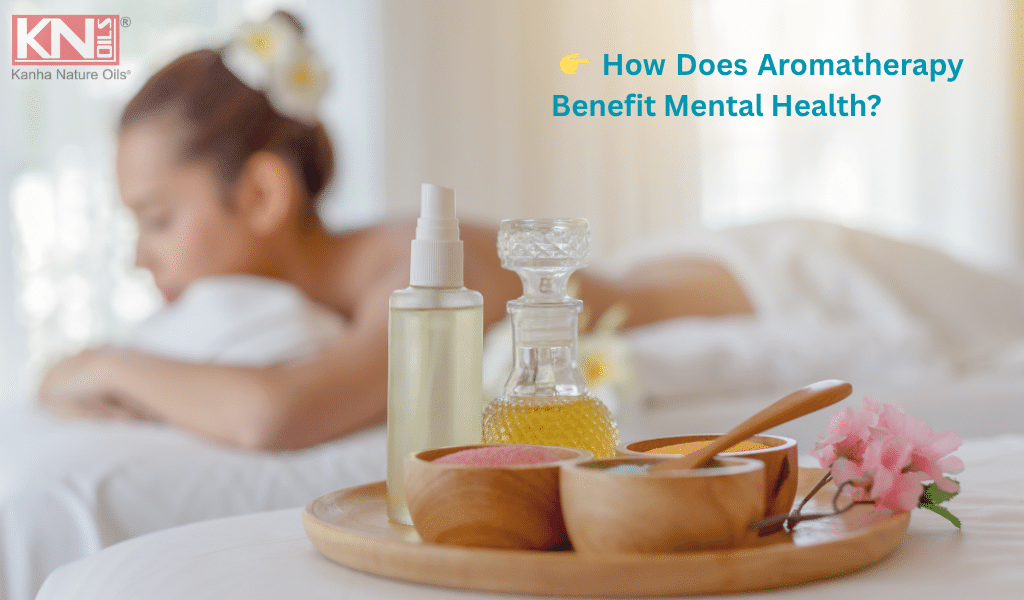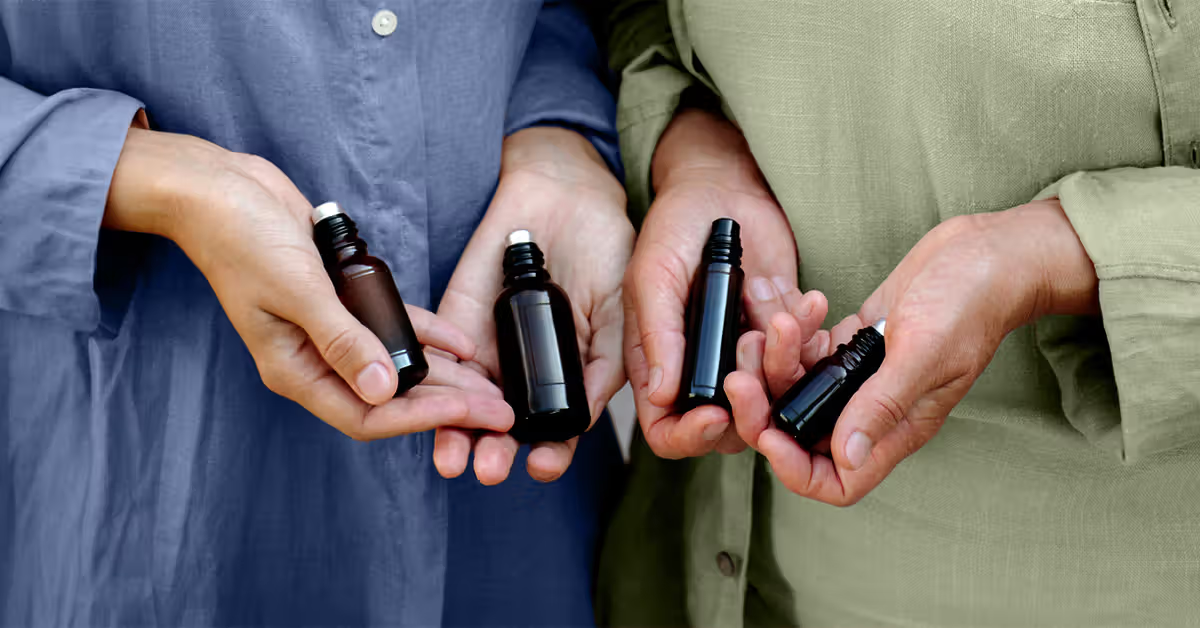In a fast-paced, stress-filled modern world, many people are seeking natural, holistic ways to restore balance and well-being. Among these, essential oils—concentrated plant extracts—have gained immense popularity for their therapeutic and aromatic properties. Used for centuries in traditional healing systems such as Ayurveda, Traditional Chinese Medicine, and ancient Egyptian practices, essential oils are now scientifically recognized for their potential to support both physical and emotional health.
Aromatherapy, the practice of using essential oils for healing through inhalation or topical application, is particularly valued for its influence on mental health. The soothing scents of essential oils can affect the limbic system—the part of the brain that regulates emotions, mood, and memory—helping alleviate stress, anxiety, depression, and insomnia.
this blog post, Kanha Nature Oils will tell you how the natural power of essential oils can help calm the mind, reduce stress, and promote emotional balance. Through the gentle art of aromatherapy, these plant-based essences have been cherished for centuries for their ability to influence mood, enhance relaxation, and support overall mental well-being.
How aromatherapy works
Aromatherapy is said to function by stimulating the sense of smell cells in your nose👃, which is a fantastic gift. In response, these receptors use your central nervous system to convey messages to your brain. The limbic system, which affects your emotions, is one area of your brain that may be stimulated by the aroma of essential oils when you use aromatherapy.
When you inhale these scents, your hypothalamus may also react by releasing feel-good brain chemicals like serotonin, which may help to lessen sadness and anxiety symptoms. Relaxation is enhanced.
Additionally, according to some experts, using essential oils to your skin and other bodily parts, including your joints, can benefit both of them and your general wellbeing.
👉 How Does Aromatherapy Benefit Mental Health?
Aromatherapy has been shown to have a number of benefits for mental health. Some of the ways that it can improve mental health include:
- Reducing Stress and Anxiety: Essential oils like lavender, chamomile, and bergamot have a calming effect on the body and mind. When these oils are used in aromatherapy, they can help reduce feelings of stress and anxiety.
- Improving Mood: Essential oils like lemon, grapefruit, and rose have been shown to have a positive impact on mood. When used in aromatherapy, these oils can help improve feelings of happiness, positivity, and joy.
- Promoting Relaxation: Essential oils like lavender, chamomile, and ylang-ylang have a relaxing effect on the body and mind. When used in aromatherapy, these oils can help promote feelings of relaxation and peace.
- Enhancing Sleep: Essential oils like lavender and chamomile have a sedative effect on the body and mind. When used in aromatherapy, these oils can help improve sleep quality and reduce symptoms of insomnia.
- Boosting Cognitive Function: Essential oils like peppermint and rosemary have been shown to have a positive impact on cognitive function. When used in aromatherapy, these oils can help improve memory and focus.
Using regular oils in aromatherapy to support mental health
 The essential oils that are claimed to have positive effects and may help treat mental health issues are extracted from a variety of plants. The following is a list of them:
The essential oils that are claimed to have positive effects and may help treat mental health issues are extracted from a variety of plants. The following is a list of them:
1. Lavender Oil
Lavender oil, Aromatherapists frequently employ lavender oil in a number of mental health therapies because of its reported many benefits. Lavender has a calming effect on the senses because of its subtle perfume. One of the best methods to use lavender aromatherapy is as a pillow spray because it helps with sleep, anxiety relief, and relaxation.
2. Cedarwood Oil
Cedarwood oil, Researchers have discovered that cedarwood essential oil has the ability to reduce tension, particularly for people who are stressed out from work or school. It’s thought that inhaling cedarwood while working may enhance productivity and sharpen focus. Although it has not yet been tested on people, cedarwood has been demonstrated to be useful in lowering the signs and symptoms of depression in rats.
3. Chamomile Oil
Chamomile Oil, It has been proved that chamomile’s depressive qualities can lessen the symptoms of depression. Chamomile is a wonderful option in situations when anxiety and depression are contributing to digestive problems because it can encourage calm and reduce gut inflammation.
4. Grapefruit Oil
Grapefruit oil, After applying grapefruit essential oil, which experts say has an uplifting and energizing impact, you can feel more invigorated. It’s frequently advised for people who are recovering from drug or alcohol addiction since they can use it to squelch cravings. In the beginning of recovery, mental health difficulties and withdrawal symptoms may persist for weeks or months. Grapefruit essential oil therapy is a holistic approach that may help with the recovery process in addiction treatment programs.
5. Bergamot Oil
Bergamot oil, derived from the peel of the bergamot orange, has a bright, citrusy aroma that uplifts mood and combats feelings of sadness or fatigue. Studies indicate that bergamot essential oil can increase levels of serotonin and dopamine, helping to reduce symptoms of mild depression and stress.
6. Ylang Ylang Oil
Ylang-ylang, has a sweet, floral fragrance known to promote feelings of joy and sensuality. It helps reduce heart rate and blood pressure, making it useful for easing tension and fostering self-confidence and harmony.
7. Rose Oil
Rose oil is deeply associated with emotional healing. Its warm, floral aroma has been found to ease symptoms of depression, grief, and loneliness. Inhaling rose oil or using it in massage can help restore a sense of emotional balance and compassion.
8. Peppermint Oil
Peppermint oil has a refreshing and energizing aroma that can help improve mental clarity, focus, and alertness. It’s particularly effective in combating mental fatigue and uplifting mood.
9. Frankincense Oil
Frankincense oil promotes spiritual grounding and mindfulness. It’s frequently used in meditation to calm the mind and enhance introspection. It has also been shown to reduce symptoms of anxiety and depression by slowing breathing and deepening relaxation.
10. Clary Sage Oil
Clary sage oil balances mood and reduces stress, particularly for women experiencing hormonal changes. Its aroma can ease anxiety and promote feelings of clarity and contentment.
How to Use Aromatherapy for Mental Health
There are several ways that you can use aromatherapy to improve your mental health. Some of the most common methods include:
Diffusing Essential Oils: You can use an essential oil diffuser to fill the air with the fragrant and therapeutic properties of essential oils. Simply add a few drops of your favorite essential oil to the diffuser, and let it run throughout the day.
Topical Application: You can apply essential oils directly to your skin by mixing them with a carrier oil like coconut or almond oil. Simply add a few drops of essential oil to the carrier oil, and massage it into your skin.
Aromatic Baths: You can also add a few drops of essential oil to your bath to reap the benefits of aromatherapy. Simply add the essential oil to your bath water, and let the steam and the scent of the oil help improve your mental health.
Massage: You can also use essential oils in a massage to improve your mental health. Simply add a few drops of essential oil to a carrier oil, and use it as a massage oil. The scent of the oil and the sensation of the massage can help improve feelings of relaxation and peace.
✔️ Improving mental health and well-being
The use of essential oils has been shown to have a number of benefits for mental health, including reducing stress and anxiety, improving mood, promoting relaxation, enhancing sleep, and boosting cognitive function. There are several methods for using aromatherapy to improve mental health, including diffusing essential oils, topical application, aromatic baths, and massage.
It’s important to note that while aromatherapy can be a helpful complementary therapy for mental health, it should not be used as a substitute for traditional medical treatment. If you are experiencing symptoms of a mental health disorder, it’s important to seek professional help from a licensed mental health provider.
When using aromatherapy for mental health, it’s also important to use high-quality essential oils that are pure and free from contaminants. It’s best to use oils that are of Good Quality, and to avoid oils that have been processed with solvents or other chemicals.
A helpful technique for enhancing mental health and wellbeing is aromatherapy. By utilizing the fragrance and healing qualities of essential oils, you can improve mood, induce relaxation, improve sleep, lessen stress and anxiety, and enhance cognitive performance. However, it’s crucial to combine aromatherapy with conventional medical care and to select pure, strong essential oils.
Conclusion
When selecting the compounds to utilize, you should exercise caution because you can be sensitive to certain of the plants that produce the essential oils. Aromatherapy oils come in a variety of grades.
If you wish to utilize essential oils to treat depression, it is necessary to purchase them in their purest form from a reputable or approved seller. Always study the manufacturer and seller of the firm before making a purchase. In recent years, there have been a lot of internet retailers, but they rarely offer pure, useful essential oils. The best essential oils are only sold by Kanha Nature Oils. To enhance your lifestyle and general health, use essential oils.
ESSENTIAL OILS IN AROMATHERAPY
You May Also Like:
- The Art of Aromatherapy: Elevating Your Mood with Essential Oils
- Myrrh Smells Like: Exploring the Unique Aroma of Ancient Resin
- Essential Oil Plants: The Ultimate Guide To Top 10 Health Boosters
Kanha Nature Oils
For more information contact: info@aromatherapyoil.in
Mobile Number: 9810805866




.png)



No comments:
Post a Comment